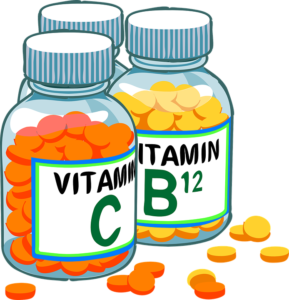
by drmiranda | Aug 11, 2016 | dietary supplements, hypothyroid, not losing weight
It’s been said tha t the road to hell is paved with good intentions, and that certainly applies to the world of dietary supplementation. Many people, through research or recommendation, choose to take a variety of dietary supplements to improve their health, but what many don’t realize is that supplements need to be taken the RIGHT way, or you will impair the absorption of them, or simply end up with very expensive urine.
t the road to hell is paved with good intentions, and that certainly applies to the world of dietary supplementation. Many people, through research or recommendation, choose to take a variety of dietary supplements to improve their health, but what many don’t realize is that supplements need to be taken the RIGHT way, or you will impair the absorption of them, or simply end up with very expensive urine.
Taking vitamins and herbal supplements together is usually not a problem but there are a few exceptions to keep in mind.
First, lets cover the basics:
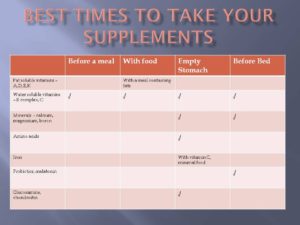
The Best Time to Take Various Vitamins and Supplements
MEAL FRIENDLY
Traditionally, it is recommended that multivitamins formulas and water soluble vitamins – including the B-complex and vitamin C get taken with your meals for optimal absorption but in reality, they can be taken any time. However, fat soluble vitamins, such as vitamins A,D,E,& K – are best taken with a meal containing fats. The dietary fats enhance the absorption of the fat soluble nutrients. One small caveat, some people are sensitive to parts of the B-complex, and that can impair sleep. If this describes you, take your B-complex vitamins before 2 pm. The biggest mistake that people make with taking a multivitamin is taking it once a day. The body can only absorb so many nutrients at a time, so taking nutrients in divided doses will ensure you get the most from the products you buy.
Fatty nutrients, like fish oil, coconut oil, flax seed oil, borage oil, evening primrose oil, and even coQ10 also do best when taken with a meal containing fats. Fats always like fats – any time you take them together, you will get more benefits.
BEST ON EMPTY STOMACH
Certain nutrients require an acidic environment for optimal absorption. This usually means they do best when you haven’t diluted your stomach acid with food prior to taking them. Iron falls into this category. Iron is notorious for not only being difficult to absorb, but it can be highly irritating to your gastrointestinal tract. For this reason, it is commonly suggested that you take iron with vitamin C, which greatly enhances the amount your body can absorb, and take it with the least amount of food your stomach can handle without getting upset. But please keep in mind that iron does not like fiber or vitamin E. Either of these will bind together with the iron and you will negate their benefit. There are forms of iron that are less irritating than others as well – so please experiment with these to find one your body tolerates.
Minerals such as magnesium and calcium* always require strong stomach acid for absorption, therefore taking them on an empty stomach will facilitate absorption as well. I usually direct my patients and clients to take their minerals at bed time, since the transit time is slower, and you can get more out of them. Additionally, minerals like magnesium have a calmative effect – so taking them prior to bed can not only help you sleep better, but they can lubricate your joints and relieve muscle pain, so you wake fresher than you otherwise would. As a general rule, I do not typically recommend routine calcium supplementation unless there is a specific reason why it is indicated. Americans consume more calcium per capita than nearly any other country, yet we have one of the highest osteoporosis rates, so clearly calcium is not the issue. On the other hand, it is estimated that upwards of 80% of the population is deficient in magnesium, and other co-factors for bone health – so I would rather concentrate my efforts there. One thing to keep
Amino acid formulas also prefer acidic environments, so taking these supplements, which are often used in body building formulas, or individually for specific repair processes, on an empty stomach will ensure you get optimal absorption from them.
Joint products like glucosamine and chondroitin also require a highly acidic environment for absorption. While it may be inconvenient that you can’t take them with your meal, you will absorb up to 4X more from them by taking them alone.
Other than calcium, probiotics are perhaps the most controversial supplement on this list. It is my opinion that most recommendations for probiotic dosing are designed to promote probiotic sales, and it not what is required for optimal absorption. I always suggest taking probiotics before bed since most people do not get up in the middle of the night to have a bowel movement. This ensures that the probiotics have the greatest amount of contact time in the intestine, which therefore gives them the greatest chance to grow and colonize. If you were to take them with food, not only are you increasing the amount that would be killed by prolonged exposure to stomach acid, but rapid peristalsis that occurs with physical activity and as your meals progress down your alimentary canal during the day, means that they keep getting pushed along, and are not in contact with the optimal regions of the large intestine to do you much good.
BEFORE MEALS
Most commonly, digestive aids, enzymes, or other products should be taken at the beginning of a meal so that they may be thoroughly mixed with what you eat in your stomach. If you take it too late during your meal, most of your meal may have already passed into the small intestine, and it is simply too late to get the benefit of the product.
SPECIAL CONSIDERATION
If you have been diagnosed as being hypothyroid, you have likely already been directed to take your medication a minimum of 3-4 hours before any foods or supplements. If you have not received this advice, please speak to your doctor or pharmacist to confirm if you should be doing this with your particular brand of medication.
Antacids elicit a quandary. Many people take them (far more than should) so their meals do not upset their stomach, yet, by diminishing your stomach acid, you also diminish your absorption of vitamins and minerals in your diet. This frequently leads to osteopenia or osteoporosis and other health problems. If you are taking your supplements with meals and you take antacids or PPI’s, then you need to speak to your healthcare providers to see what you can do to optimize your absorption of healthy nutrients.
What you wash your supplements down with also makes a difference. Many medications and supplements interact with grapefruit juice, so please don’t use it to take pills of any form. That just plays it on the safe side. Green tea also interacts with a huge list of medications and supplements, so please avoid taking the two together. Milk can interfere with the absorption of a variety of nutrients, and therefore I do not recommend taking supplements with milk either. Even water can be problematic since some people tend to get reflux or their supplements will repeat on them if taken with plain old H20. So what can you take your supplements with — I recommend something lightly flavored, like diluted fruit juice or herbal teas. Even water with lemon.
Herbal supplements all very, so please follow the label instructions on them for optimal results.
So, as you can see, most supplements can be taken safely with your meals, and there are only a few exceptions to the rules. Knowing this, it becomes relative easy for you to divide up your supplements into a few you take with meals, and some on their own. Dietary supplementation need not be complicated. In my opinion, it is better to do something than nothing at all, and hopefully with this little guideline, it simplifies things enough so that you can use timing to get the most out of your health regimen.
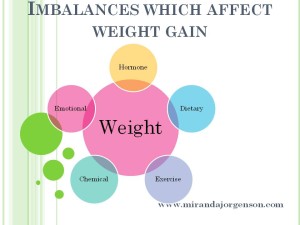
by drmiranda | Oct 20, 2015 | chiropractic, diet, dietary supplements, gallbladder, not losing weight, weight loss
THERE IS NO MAGIC BULLET WHEN IT COMES TO WEIGHT LOSS! That is why there is NO SINGLE THING that will work for everyone. There are simply too many factors involved. That said, we can encompass these factors into key categories: Dietary, Hormonal, Chemical, Exercise, and last but not least – Emotional. Dietary factors are the easiest to explain – you have to feed your body real food and provide it with nutritionally sound fuel if you want it to function at a decent level. You wouldn’t put bad gas in your car and expect it to run well, the same can be said for your body. The second imbalance is hormonal – while we have dozens of hormones that readily affect our weight, with women, thyroid, adrenal, or sex hormone imbalances are the most common culprits. Chemical imbalances are both the easiest and the hardest to change. You have control over the chemicals you expose your body to, you may not have as much control over the medications you take. Nearly every drug that is prescribed not only induces specific vitamin and mineral depletions, but many are highly toxic and have a plethora of side effects. There is a long list of medications that not only impair weight loss but can cause weight gain. If you are on prescribed medications which are associated with weight issues- speak to your prescribing physician to see if there are better options (with fewer side effects) available to you. Exercise is the factor which everyone underestimates. Now, I don’t think you need to run marathons or bench press your weight, but most people think they exercise far more than they do. Get a pedometer and keep a record of your physical activity. Walking is one of the best activities you can do. If you can handle more, look into HIIT, yoga, swimming, or even mild weights. Chiropractors are always fond of the saying, “move it or lose it” – if you are not actively moving your joints, you accelerate the aging process, and your strength and flexibility will decrease at a fairly consistent rate. Lastly – lets look at emotional factors. There is a HUGE emotional component to weight loss (and to allergies, but I will save that conversation for another day). Some of us get comfort from food. Some of us were conditioned as children to ‘clean our plates’, some are addicted to fats and sweets. Women that are nurturing and caregivers tend to struggle with weight more than those that are not care givers. Some use fat as an insulation against emotions. Some of us mentally *see* ourselves as a big girl, and can’t even imagine ourselves thinner. Some of us have given up hope.

Let me be very blunt – no one will ever reach and maintain their ‘happy weight’ unless all of these factors are balanced. You might lose and regain the same 15 (or 40) lbs over and over, but you will not be able to maintain it. As a chiropractor, I am trained in balancing the body – that is what we do. We balance it so it works correctly. Moving into the weight loss realm isn’t that much different – you will notice that everything I suggest or recommend isn’t extreme, it is practical & doable. I focus on helping you achieve balance – and I give you simple tools to accomplish that. It could be supplements to balance what your gallbladder should be doing. It could be supplements which balance your body chemistry so you can enhance your metabolism. It may be easy activities like walking to increase your cardiovascular fitness and lymph flow. I may suggest you speak to your physician about certain medications, and I may even suggest other things which impact those emotional factors.
Weight loss is a process, your happy weight is the destination. The road isn’t easy, but it isn’t hard either – it just requires consistent effort. The process doesn’t usually occur at warp speed, but you didn’t accumulate those impairments to your health overnight either. I have dedicated my life to helping people – and if YOU don’t give up on you, I won’t either! Anyone who purchases products from me, whether it is Beta, Vitamin D, – or anything else, becomes my personal client. I send you my personal phone number, my email, and make myself completely accessible to you. I will help you reach your goals, but I want you to know that I can’t do the work for you – only steer you in the right direction. You are always in control of your own destiny.
So, as you’ve read this, and are contemplating your own situation, ask yourself if you are balanced. Are you focusing all of your efforts on one factor and ignoring the rest? If you make a concerted effort to achieve balance in all of these 5 factors, I can absolutely guarantee you that you will achieve your happy weight and never leave it again!
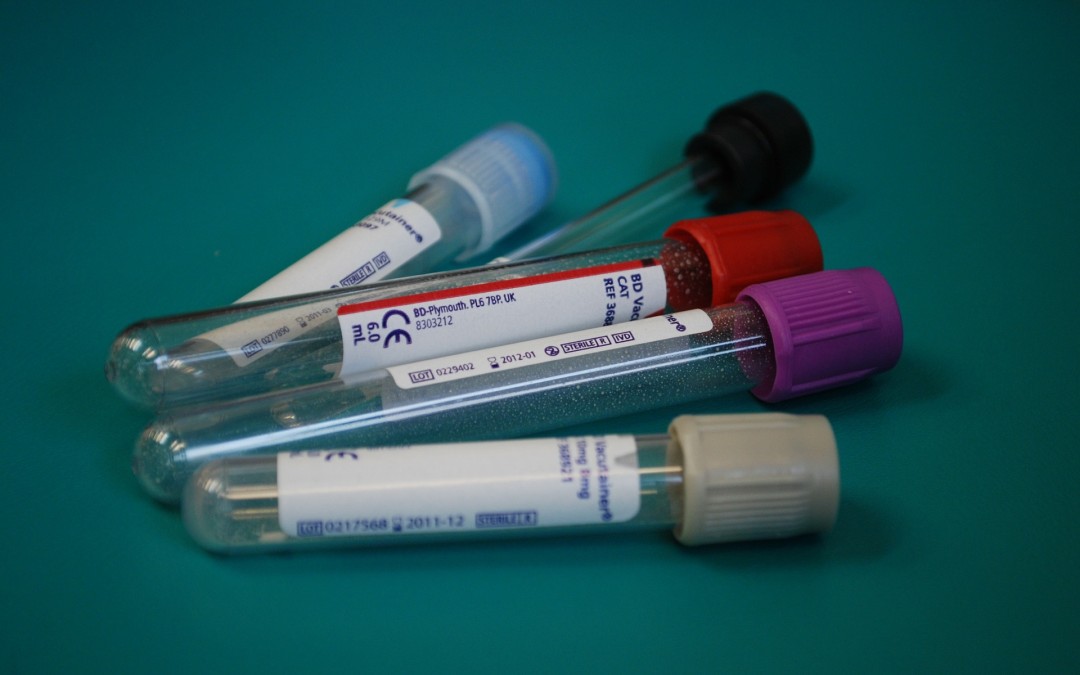
by drmiranda | Sep 1, 2015 | blood test, fatigue, health, hypothyroid, inflammation, insulin resistance, not losing weight, obesity, weight loss
You’ve heard about preemptive strikes, how about preemptive health? Don’t wait until you are really sick to get blood work drawn. Have it drawn at your yearly physical and keep a copy for your records. You OWN your medical records, by the way, your physician is just the custodian of them – so you are legally entitled to a copy of anything contained within it.
PREEMPTIVE HEALTH: What Blood Work to Request from Your Doctor
I get a lot of requests from people asking what blood tests they should request at their next medical appointment. Along with getting a standard Chemistry Panel and Complete Blood Count (CBC) which should include RBC Magnesium and RBC Potassium , here are the ones I commonly recommend for women. Men would have a few slight differences.
1) Complete Thyroid Panel :
TSH (many doctors only test TSH, and that is like trying to diagnose what is wrong with your foot by only looking at your big toe)
Free T3 (also known as: Triiodothyronine, Free)
Free T4, Direct S (Not Free T4 Index, Free T4 calculated, or TSH reflux)
Reverse T3 (If your doctor will do this and/or if it’s available in your country)
***Because this test includes a TSH screening, remember that medications like corticosteroids, aspirin and lithium can interfere with those results. Also, if you’ve had a recent X-ray that used iodine dye – or other radioactive tests – ask your doctor when you can take an accurate TSH test. Pregnant women in their first trimester should also ask their doctor about the proper time to get a TSH test.
If you have symptoms of hypothyroidism and/or Hashimoto’s Disease, add these :
Thyroid Peroxidase Antibody (TPOab)
Anti-Thyroglobulin (TgAb)
If you have symptoms of hyperthyroidism (much less common), add these:
Thyroid Stimulating Immunoglobulin (TSI)
Thyroid Receptor Antibody (TrAb)
2) Iron panel:
Serum iron
Total Iron Binding Capacity (TIBC)
%Saturation
Ferritin
3) Vitamins:
B12
D3
4) Sex Hormones (serum blood):
Testosterone
Estradiol
Progesterone
FSH
LH
DHEA
***The sex hormone tests should be done 7 days after ovulation. If you don’t know when you ovulate, an ovulation kit can be purchased from a drugstore, or you can just test on day 21, if you still menstruate. If you no longer cycle, the tests can be done anytime.
5) Other tests:
C-Reactive Protein (systemic inflammation marker)
Cholesterol panel ( I don’t care if it is high, I look at the ratios, and your CRP level^^^)
Fibrinogen (clotting & inflammation marker)
Hemoglobin A1C (long term measure of glucose status)
Homocysteine ( risk for coronary artery disease, fractures, and other disorders)
################################################################################################
A) If you have ANY chronic health conditions, I recommend getting an ELISA Food Sensitivity and Allergy Panel done. It is an easy way to identify what you consume that is contributing to your systemic inflammation. Most family doctors do not perform these tests, you will need to go to someone familiar with them. ALCAT and ALLETESS are the two brands of testing that I have used with my patients. Their respective websites can help you locate a practitioner who is versed in them www.alcat.com , www.foodallergy.com
B ) If you have symptoms of low cortisol/ or adrenal fatigue, then salivary cortisol tests should be considered. Cortisol levels: 24-hour saliva cortisol tests from Canary Club and MyMedLab are done through ZRT Laboratories: http://www.canaryclub.org/diurnal-cortisol-4x-stress-hormone-kit.html ($119+shipping) or https://sttm.mymedlab.com/sttm-profiles/sttm-24-hour-cortisol-dhea ($125)
Symptoms of low cortisol: http://www.stopthethyroidmadness.com/adrenal-info/symptoms-low-cortisol/
C) Educate yourself! Read up on what you are experiencing: Books I highly recommend: Type II Hypothyroidism, Dr. Mark Starr; Stop the Thyroid Madness, Janie Bowthorpe; What is Your Menopause Type? Joseph Collins ; Death to Diabetes, DeWayne McCulley, The Blood Sugar Solution, Dr. Mark Hyman; The Adrenal Reset Diet, Dr. Alan Christianson; Hashimoto’s Thyroiditis, Wentz & Nowasadzka.
©2015, MirandaJorgenson, www.mirandajorgenson.com
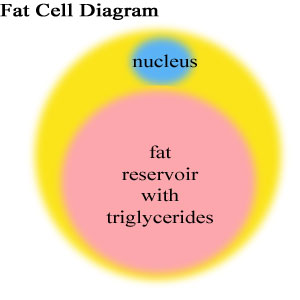
by drmiranda | Jul 15, 2015 | blood supply, diet, dietary supplements, fat breakdown, fatigue, health, insulin resistance, lipolysis, not losing weight, plateau, walking, water retention, weight gain, weight loss
This is an aspect of weight loss that perplexes a lot of people – they start a new diet and notice their clothes getting looser, or their face getting thinner – but their weight is staying the exact same! It is frustrating, because you *think* your diet is working but you step on the scale and feel like a big old failure.
Well, I am here to tell you that you can relax! You are not a failure! You are experiencing the wonders of the fat cell in action (I can hear you saying, “big whoop — skinny thighs are what excites me!”).
Let’s start off with a little physiology lesson. In your body you have 10-30 billion fat cells, and that is if you are of a healthy weight. Overweight people can have 75 billion fat cells or more, and it is not unheard of for morbidly obese people to have 250-300 billion fat cells overwhelming their boney frames! That is a LOT of fat cells (adipocytes). Picture each fat cell like a little deflated balloon. That balloon can be relatively empty or filled to the brim and be stretched over 10x its normal size. Now these fat cells are stubborn creatures – you can always make more, but once you have them, they are yours for good. Up until very recently1, it was thought that the only way to get rid of fat cells was to cut them out, but you can deflate them — and this is the key to losing weight effectively.

You see, fat cells are little storage tanks, and despite your most heartfelt desires to the contrary, they are remarkably efficient at storing fat in the form of triglycerides within the cell. When we want to burn fat – it isn’t an easy matter of having your brain tell your body, “we need more energy – let’s burn that love handle”. It doesn’t work that way! We need two enzymes, hormone sensitive lipase and adipose glyceride lipase to break down the triglyceride within fat cell where it is then released into the bloodstream as FFA’s. The more blood supply an area has, the better it can whisk away those FFA’s that are getting dumped from the fat cells. You can see this on your own body — take a second and poke your facial cheeks. See, the fat there is nice and soft because it has a good blood supply. Now grab the fat on your belly or on your butt. Feel the difference? It is dense and hard. It doesn’t have a good blood supply to whisk fat away. This is why when you start losing weight, it usually leave the ‘soft’ places first – your face, breasts, and arms and leaves you feeling like a saggy humpty dumpty for a while. This blood flow issue also leads us to our key point – when you start a diet and are burning fat, the scale often stays immobile despite you noticing that you are shrinking. This happens because the body abhors a vacuum. When the adipocytes dump out their fatty contents, your body doesn’t like to see an empty cell – so it shuttles water into the cell to fill up the space the fat just occupied. This is also why fat loss can be considered an inflammatory process and why you often feel bad, tired, sick, or swollen when you are dieting (there are other chemical factors, but we will discuss those at another time). Your body is literally replacing the fat with water! This process is more extreme for some people than for others, and some fortunate souls experience very little of this water replacement. This is also why your stomach or thighs can feel mushy or spongy when you are losing weight – you are replacing a dense fat with water.
So, what you can do, especially if you know that you have resilient fat or are a water hoarder? Well, there are a few simple things:
- Stay hydrated. I know, you’re thinking, “Why put more water into a swollen body?”, — Well, you need to flush out the metabolites from breaking down those FFA’s.
- Limit Caffeine and Alcohol. A little of either substance is OK, and small doses of caffeine can even be beneficial because it has a mild diuretic effect. Large amounts of either (and by large I am referring to more than 3 caffeinated beverages or more than 1 glass of wine or beer each day) can cause you to swell up like a balloon at the Macy’s Day Parade AND make your hard-earned weight loss come to a grinding halt.
- Shake your booty. Yes, I said it. The largest lymphatic pump in your body is the quadriceps muscles in your legs, so anything that gets those quads pumping — like walking, dancing, or biking, increases your lymph flow and your blood flow. If you work yourself up to a decent exertion point, then you will really increase systemic blood flow, and breathing (and breathing is the means by which your body excretes the metabolites of burnt fat cells!). Dig out those Richard Simmons’ shorts you’ve been hanging onto for the past 20 years — (they are back in style) and get ‘Sweatin’ to the Oldies!’
So there you have it! Know that you are not hallucinating – your face is thinner, your breasts are shrinking, and those bingo wings are real. Your scale just hasn’t caught up with your body! The more you follow the above steps – the faster you will purge that excess water (and inflammation) and the scale will start moving in the right direction.
1.http://www.nytimes.com/2008/05/05/health/research/05fat.html?_r=0

 t the road to hell is paved with good intentions, and that certainly applies to the world of dietary supplementation. Many people, through research or recommendation, choose to take a variety of dietary supplements to improve their health, but what many don’t realize is that supplements need to be taken the RIGHT way, or you will impair the absorption of them, or simply end up with very expensive urine.
t the road to hell is paved with good intentions, and that certainly applies to the world of dietary supplementation. Many people, through research or recommendation, choose to take a variety of dietary supplements to improve their health, but what many don’t realize is that supplements need to be taken the RIGHT way, or you will impair the absorption of them, or simply end up with very expensive urine.



